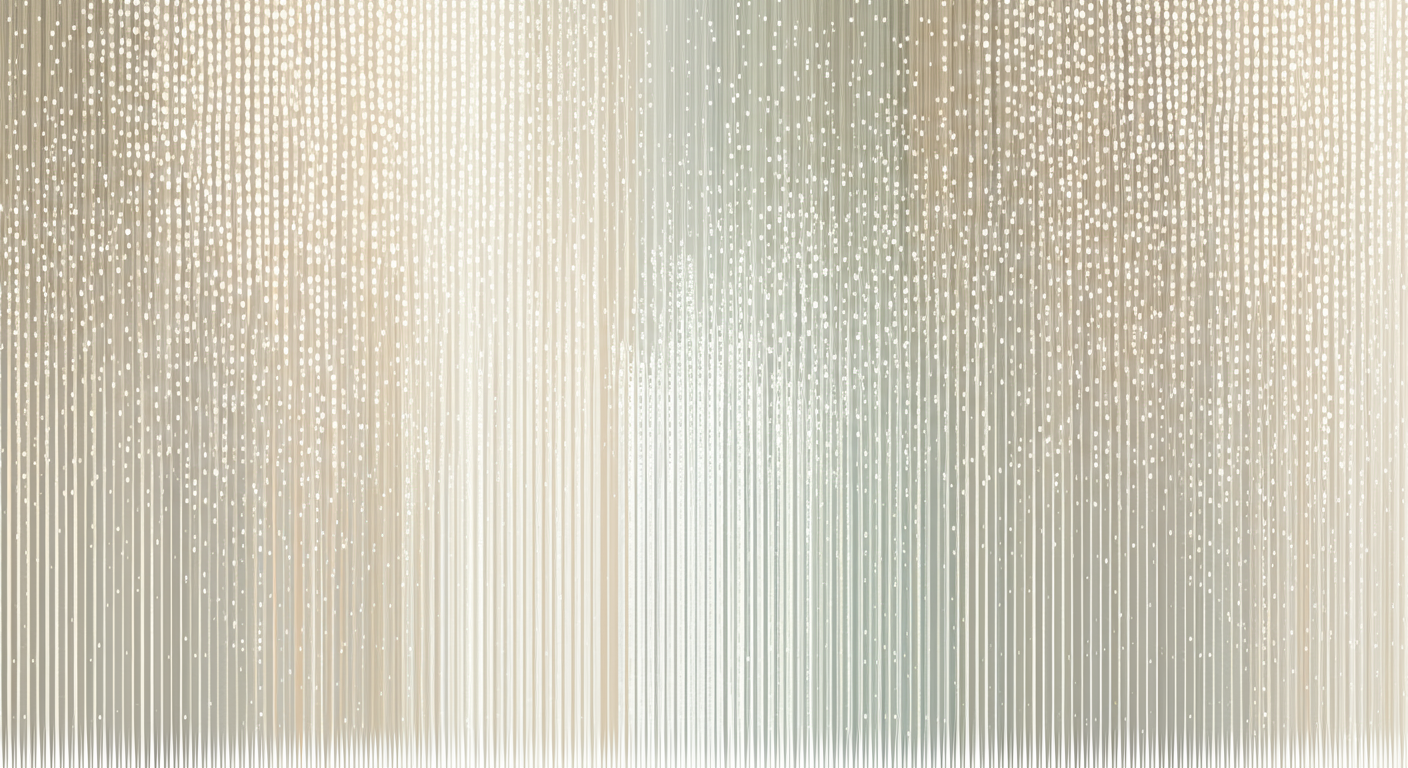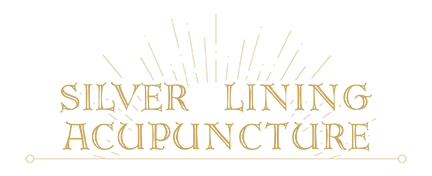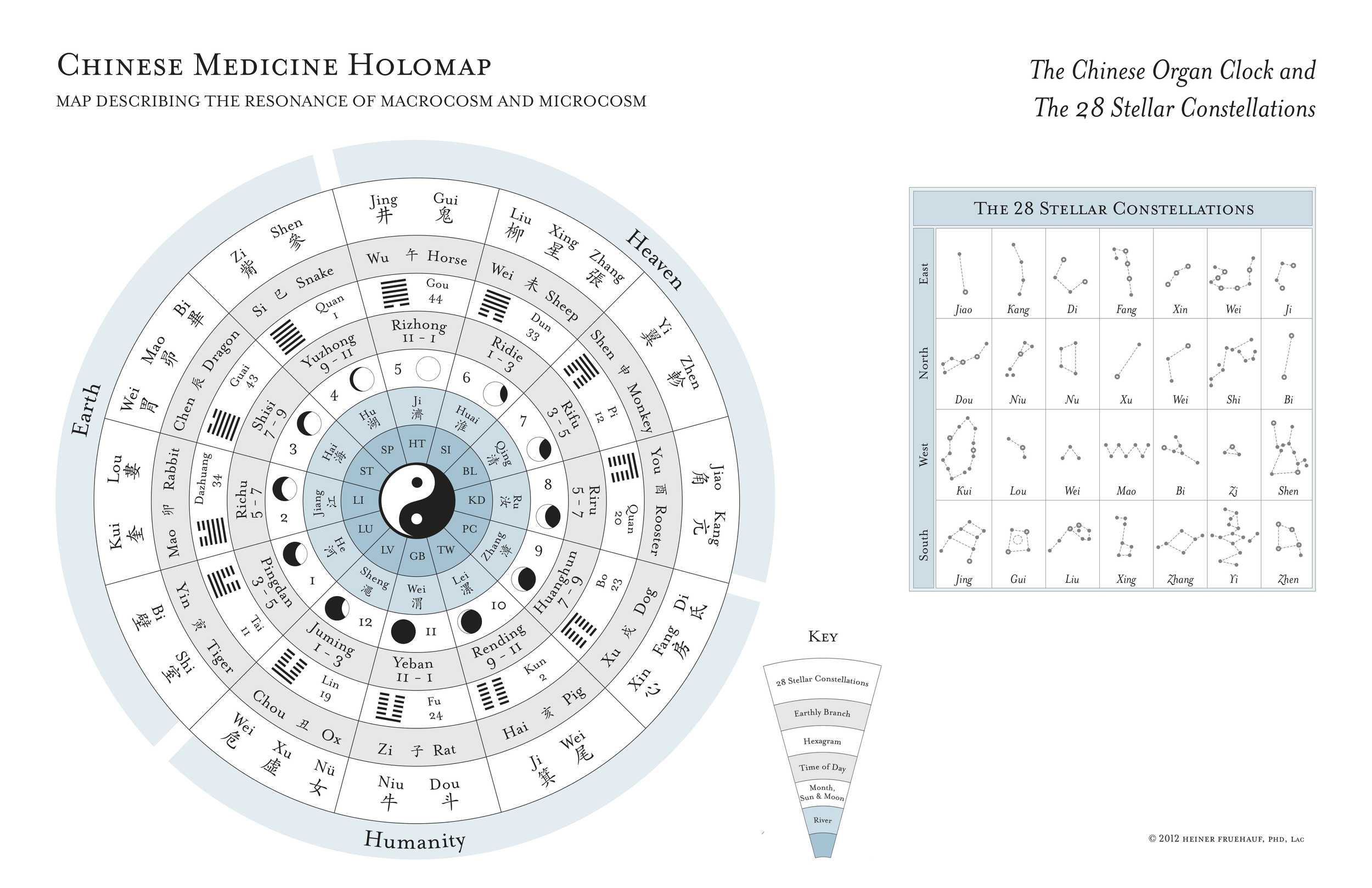
Where Does Acupuncture Come From?
Acupuncture has its roots in ancient Chinese cosmology and medical philosophy, as documented over 2,000 years ago in the Huangdi Neijing, particularly in the foundational text Lingshu jing 靈樞經 (Spiritual Pivot).
The characters 靈 (ling), 樞 (shu), and 經 (jing) are themselves symbolic:
靈 (ling) evokes the image of a female shaman dancing in ritual—calling down heaven to meet earth. It means spiritual or magical—a force that produces visible results.
樞 (shu) means pivot—like a celestial hinge, around which the cosmos turns.
經 (jing) is translated as “classic”—a text that has timeless truth and cannot be warped by the individual.
Together, the title Lingshu jing becomes: The classical text that describes the magical turning point between spirit and body, cosmos and human, above and below.
Classical Chinese medical texts are not merely ancient medicinal theory—they are maps of transformation, decoding how nature moves through us, and how healing occurs by returning to resonance with those rhythms.

What does Lingshu (靈樞) Actually Mean?
The classical text Lingshu jing (靈樞經), often translated as The Spiritual Pivot, is not just an acupuncture manual—it’s a metaphysical map of reality.
靈 Líng means “spirit,” “numinous,” or “magical.” It suggests something beyond the physical—a mysterious, animating force capable of instant, transformative effects. In early Chinese cosmology, ling implied divine responsiveness—a sacred interaction between heaven and earth.
樞 Shū means “pivot” or “hinge”—a central point that allows movement, rotation, or transformation. Think of it as the axis around which the universe turns, or the doorway between seen and unseen.
Together, Lingshu refers to the sacred turning point where spirit and matter intersect. The title tells us this is not a technical how-to guide on where to place needles—it’s a symbolic manual for transformation.
What the Classical Texts Reveal
The Text as Symbolic Code, Not Just Technique
Rather than a book of purely physical techniques, the Lingshu is written in coded symbolic language. It explains how:
The energetic, functional layers of the body (Qi, Shen, organ networks) relate to
The visible, measurable structures (anatomy, symptoms, physical illness)
In other words, it teaches us to read the body like a holographic mirror of the cosmos—a resonant field where meaning, emotion, and biology interact. Acupuncture, in this view, isn't merely mechanical—it’s symbolic and alchemical.
A Scientific System of
“As Above, So Below”
This system mirrors ancient and modern scientific principles of resonance and correspondence—what happens in the macrocosm (heaven, time, nature) reflects in the microcosm (the human body). Thus, the Lingshu offers a scientific methodology of symbols, where the practitioner tunes into patterns of disharmony and restores them through precise, symbolic intervention.
This is what makes it “magical”:
Change isn’t just physical—it happens in real time across body, mind, and spirit.
Healing is not linear—it’s an activation of a hidden pivot, an opening that transforms the entire field of being.
Immediate Transformation through the “Ling” Effect
The ling aspect of acupuncture refers to this seemingly instantaneous shift:
A needle can dissolve long-held pain.
A point can awaken buried emotion.
A treatment can initiate profound life change.
This is real-time magic, not in a supernatural sense, but in the way consciousness and pattern reorganize through subtle resonance. When the treatment aligns with the patient's destiny and timing, it produces what feels like miraculous results.

Acupuncture as Consciousness Work
Dr. Leon Hammer, a renowned psychiatrist, acupuncturist, pulse diagnostician and classical medicine teacher, explains that acupuncture:
“Provides an opening to the unconscious and a break in maladaptive feedback loops.”
In other words, acupuncture doesn’t just relieve pain—it interrupts stuck patterns, often ones we’re not even aware of. That interruption creates the opportunity for new behavior, new emotion, and new awareness.
And this process isn’t always comfortable. As Hammer writes:
“The growing awareness is often painful as well as gratifying, since awareness is the antithesis of denial… From the first encounter with needles, that side of a person that wants most to feel fully alive is engaged in unraveling the enigma of an avoidance of one’s own life.”
So, even the pain that may arise during healing has purpose—it’s the body's way of reawakening to aliveness.
Acupuncture invites that side of you that yearns for fullness, clarity, and connection to come forward and lead.
What This Means for You
Acupuncture is not just about symptom relief—it’s about restoring alignment with your deepest truth.
The treatment may seem subtle, but it taps into ancient symbolic laws that govern your biology and psyche.
With the right practitioner, each session is an invitation to step through the hinge (樞 shu) between who you were and who you are becoming.
From a classical Chinese medicine perspective, healing isn't mechanical—it’s cosmological. Acupuncture doesn’t just move Qi—it pivots the spirit.
When performed with intention and reverence, it’s an art form that stirs the deepest layers of the soul. The symbols, points, and channels act as keys, unlocking the body's wisdom and restoring alignment with your destiny path.
Each treatment is a ceremony:
The needle invites awareness.
The body becomes the altar.
The Qi moves in rhythm with the stars.
And you are transformed.
How Does Acupuncture Work?
As described in the Lingshu, acupuncture is the insertion of a magical needle—a precise touchpoint that brings the body into harmony with the universe.
While we cannot always change life’s stressors, acupuncture restores the free flow of Qi (氣)—the animating life force that pulses through the body—helping shift physical, emotional, and energetic stagnation. When Qi flows properly, the body becomes a vessel for clarity, resilience, and evolution.
Acupuncture opens unconscious patterns and feedback loops, offering a new way forward. As new neural pathways form, your physiology and perception begin to transform—one point at a time.
The Organ Clock
Dr. Heiner Fruehauf developed the Chinese Medicine Holomap from the cosmological codes embedded in the Neijing. It’s based on the 12-year orbit of Jupiter, mirrored in the 12 Earthly Branches, the 12 months of the year, the 12 zodiac animals, the 12 rivers, 12 tidal hexagrams, the 12 two-hour time intervals in each 24-hour day, and the 12 energetic organ networks described in the classics.
This holomap functions like a cosmic clock—each organ network governs a specific time of day and season of the year, linking your internal rhythms to the movements of the stars.
Each organ network is not a structure, but a functional field—a symbolic mirror of physical, emotional, and spiritual functions. These networks influence your body, mood, dreams, coping mechanisms, and even life lessons. When the energy of an organ network becomes blocked or out of sync, symptoms arise. Acupuncture works by realigning your system with the wisdom of these cosmic cycles.
© 2012 HEINER FRUEHAUF, PHD, LAC
https://classicalchinesemedicine.org/chinese-medicine-holomap-28-stellar-constellations/“The Classic of the Magical Pivot outlines a scientific methodology based on symbols and resonance that connect as above, so below—which produces results that seemingly magically transform disease into health.”

FAQs
How does acupuncture work?
Acupuncture works by stimulating points along energetic pathways called meridians, which connect your organs, muscles, skin, and tissues. When energy (Qi) gets blocked or stagnant, it can disrupt physical and emotional well-being. Acupuncture points act like energetic “access ports” that help restore flow and rebalance your system.
What does acupuncture treat?
Rather than just addressing symptoms, acupuncture treats the whole person. Each session is tailored to your unique needs—whether you're experiencing pain, hormonal imbalance, anxiety, sleep issues, or digestive troubles. It supports your body’s natural ability to heal and restore balance.
Can acupuncture help with stress or anxiety?
Yes! Acupuncture is widely used to regulate the nervous system, reduce stress hormones, and promote a sense of peace and emotional balance. Many people come specifically for anxiety, burnout, or emotional overwhelm, and find regular sessions help them feel more resilient and calm.
Do I have to be sick to benefit from acupuncture?
Not at all! Acupuncture supports overall wellness—improving sleep, digestion, circulation, relaxation, and mood. It’s a powerful preventive medicine that helps maintain your health, even when you feel fine.
What will my acupuncturist ask me?
We may ask about sleep, digestion, pain, menstrual cycle, and emotions—and we may even ask to check your pulse and look at your tongue. These help us assess your whole-body health and customize your treatment.
Will I be able to relax?
Highly likely! Most patients feel peaceful, grounded, and restored during and after a session. We recommend avoiding caffeine before your appointment and silencing your phone.
What if I’m sensitive or neurodivergent?
We know that acupuncture can feel unfamiliar, especially if you're sensitive to touch, sound, or unexpected sensations—or if you're neurodivergent and appreciate more structure, control, or predictability during your care.
We welcome you just as you are.
Our practitioners are experienced in working with a wide range of sensitivities and will always meet you where you’re at. If you feel nervous, overwhelmed, or unsure, we’re happy to slow things down, explain every step, or pause at any time. You are in control of your session.
We can adapt your treatment by:
Using fewer or no needles (non-insertive tools like tuning forks, acupressure, or essential oils are great alternatives)
Choosing extra-gentle techniques with shallow needle insertion
Offering ear seeds instead of body points
Creating a quiet, dim environment—or adjusting lighting, music, or temperature to your preference
Avoiding surprise sensations by narrating the process beforehand
You’re also welcome to bring your own headphones, music, fidget tool, or anything that helps you feel calm and safe.
Our goal is to create a treatment space that feels grounded, respectful, and soothing—no pressure, no judgment, and no “one right way” to heal. Just your pace, your preferences, your body’s wisdom.
How many sessions will I need?
That depends on your condition. Some people feel relief after one treatment, while others need a series to see lasting change—especially for chronic issues. Like exercise, consistency matters. A typical course of care is 16–20 sessions, often spread out weekly or biweekly.
How long is a session?
Acupuncture sessions include time to review your current concerns, a customized treatment that includes needle insertion and any additional modalities your practitioner recommends that day—such as moxibustion, essential oils, tuning forks—followed by a deeply relaxing rest period on the table to allow your body to fully integrate the treatment.
Your first visit is about 90 minutes, including an in-depth intake to go over your health history and long-term goals.
Follow-up visits are typically 60 minutes, and include a shorter check-in before your treatment begins.
Cupping or hands-on bodywork can be added to any session for a small additional fee, usually extending your visit by about 15 minutes.
What should I wear?
Loose, comfortable clothing is best. Most points are on the arms, legs, head, and back. We’ll keep you covered and comfortable with blankets as needed. If you’re modest, a tank top and loose pants usually give us the access we need.
Should I eat beforehand?
Yes! A light snack 1–2 hours before your appointment helps your body respond better. Avoid arriving on an empty stomach.
How should I feel after acupuncture?
Most people feel relaxed, calm, and grounded after a session. Some feel energized and clear-headed, while others may feel slightly tired or emotional as their body processes the treatment. All are normal and part of the healing response.
Can I work out after an acupuncture session?
It’s best to take it easy after your treatment to allow your body to fully absorb the benefits. Gentle movement like walking, stretching, or yoga is usually fine and may even help circulation—but intense workouts, running, or heavy lifting are not recommended immediately after a session.
Acupuncture can leave you feeling deeply relaxed or even a little fatigued, so listen to your body and give it the time it needs to recalibrate.
What if something feels weird after acupuncture?
It’s totally normal to feel a little “off” after your session—this is usually a good sign that your body is processing and rebalancing. You might feel unusually tired, energized, emotional, floaty, or even have some muscle soreness or mild symptoms shift. These are short-term and generally part of the healing response.
If something feels really weird or concerning, please don’t hesitate to reach out. We’re happy to check in and offer guidance. Most sensations resolve within 24–48 hours, and gentle movement, rest, staying hydrated, and avoiding alcohol or heavy meals can help ease the transition.
Remember: healing isn’t always linear, and weird doesn’t mean wrong—your body is doing deep work!
Does acupuncture hurt?
Not really! The needles are ultra-thin—about the size of a strand of hair—nothing like the hollow needles used for shots or blood draws. Most people are surprised at how little they feel. Some points you might not feel at all; others may feel like a quick pinch, a light pressure, or a subtle wave of sensation that quickly fades. Most patients find treatments deeply relaxing and even fall asleep.
Are the needles safe?
Yes. We use sterile, single-use, disposable needles for every treatment. They're much thinner and gentler than standard medical needles.
Is it just needles?
Acupuncture often includes other therapies like cupping, gua sha, moxibustion (herbal heat therapy), acupressure, bodywork, or Chinese herbs. Your treatment plan may include any of these, depending on your needs and your practitioner’s training.
What if I’m scared of needles?
That’s completely okay—many people feel nervous before their first acupuncture treatment, especially if they’ve had unpleasant experiences with needles in the past. Our goal is to help you feel safe, comfortable, and in control. If you're anxious, we can start slowly, explain each step, or even begin with non-needle techniques like acupressure, tuning forks, cupping, or moxibustion until you're ready to try a needle or two.
Are there any side effects?
Side effects are rare and usually mild—such as slight bruising, soreness, or a small drop of blood at the needle site. If you have a bleeding disorder or take blood thinners, let us know in advance.
Can I receive acupuncture if I’m pregnant?
Yes—with a qualified practitioner, acupuncture can be very beneficial during pregnancy for managing nausea, fatigue, back pain, anxiety, and preparing the body for labor. We use pregnancy-safe protocols and avoid certain points, so please always let us know if you're pregnant or trying to conceive.
Can kids or teens receive acupuncture?
Yes! Acupuncture is safe for children and teens, and treatments can be modified to suit their comfort level. For younger kids or those sensitive to needles, we may use non-needle techniques like acupressure, tuning forks, or gentle bodywork.
Can my animal companion get acupuncture?
Yes, they absolutely can! Veterinary acupuncture is a well-respected branch of Traditional Chinese Medicine and is used to treat pain, arthritis, nerve issues, digestive disorders, and even anxiety in pets.
That said, animal acupuncture must be performed by a licensed veterinarian who is also certified in acupuncture. If you're curious about this for your pup, we’re happy to refer you to a trusted local veterinary acupuncturist who can treat animals safely and effectively.
References
Fruehauf H. The Ancient Chinese Holomap of the Body: Exploring the Mystery of the Acupuncture Point Names. ClassicalChineseMedicine.org. Published 2016. Accessed August 29, 2021. https://classicalchinesemedicine.org/ancient-chinese-holomap-body-exploring-mystery-acupuncturepoint-names/
Hammer L. A Discussion of Terrain, Stress, Root and Vulnerability within Chinese Medicine. © Chinese Medicine Times. 2010;5. Accessed July 16, 2021. https://www.dragonrises.edu/wp-content/ themes/dragon/downloads/articles/A-Discussion-of-Terrain-Stress-Root-and Vulnerability-within-Chinese-Medicine.pdf
Hammer L. Dragon Rises, Red Bird Flies : Psychology & Chinese Medicine. Eastland Press; 2010.
Heiner Fruehauf. The Organ Networks of Chinese Medicine : A Reference Guide of Cosmology, Symbolism and Diagnostic Approaches. Hai Shan Press; 2015.
Heiner Fruehauf. Chinese Medicine Holomap with the 28 Stellar Constellations. ClassicalChineseMedicine.org. Published October 31, 2013. Accessed July 31, 2025. https://classicalchinesemedicine.org/chinese-medicine-holomap-28-stellar-constellations/
Heiner F. Contemplating the Concept of the Centre in Chinese Medicine: Theoretical and Practical Considerations. Journal of Chinese Medicine. 2019;120(2):66-73.



